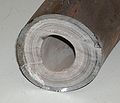Limescale
Limescale[edit]
Limescale, also known as calcium carbonate buildup, is a common problem that occurs in household appliances and plumbing systems. It is formed when hard water, which contains high levels of minerals such as calcium and magnesium, is heated or evaporates, leaving behind a white, chalky residue.
Formation[edit]
Limescale forms when the minerals in hard water react with heat or evaporation. When water is heated, the solubility of calcium carbonate decreases, causing it to precipitate and form limescale. This process is particularly noticeable in appliances such as kettles, coffee makers, and water heaters, where hot water is frequently used.
Effects[edit]
The buildup of limescale can have several negative effects on appliances and plumbing systems. Firstly, it can reduce the efficiency of appliances by insulating heating elements and reducing heat transfer. This can lead to increased energy consumption and higher utility bills.
Secondly, limescale can clog pipes and reduce water flow. Over time, this can result in decreased water pressure and potentially damage plumbing systems. In severe cases, limescale buildup can even lead to pipe blockages and the need for costly repairs.
Prevention and Removal[edit]
Preventing limescale buildup is essential to maintain the efficiency and longevity of appliances and plumbing systems. Here are some preventive measures:
1. **Water Softening**: Installing a water softener can help remove the minerals that cause limescale. These devices use ion exchange to replace calcium and magnesium ions with sodium ions, resulting in softer water.
2. **Descaling Agents**: Regularly using descaling agents can help dissolve and remove existing limescale buildup. These agents are typically acidic and can be applied to appliances such as kettles and coffee makers.
3. **Cleaning and Maintenance**: Regularly cleaning appliances and plumbing fixtures can help prevent limescale buildup. Using vinegar or lemon juice as natural cleaning agents can be effective in removing limescale.
References[edit]
<references />
See Also[edit]
Ad. Transform your life with W8MD's Budget GLP-1 injections from $75


W8MD offers a medical weight loss program to lose weight in Philadelphia. Our physician-supervised medical weight loss provides:
- Weight loss injections in NYC (generic and brand names):
- Zepbound / Mounjaro, Wegovy / Ozempic, Saxenda
- Most insurances accepted or discounted self-pay rates. We will obtain insurance prior authorizations if needed.
- Generic GLP1 weight loss injections from $75 for the starting dose.
- Also offer prescription weight loss medications including Phentermine, Qsymia, Diethylpropion, Contrave etc.
NYC weight loss doctor appointmentsNYC weight loss doctor appointments
Start your NYC weight loss journey today at our NYC medical weight loss and Philadelphia medical weight loss clinics.
- Call 718-946-5500 to lose weight in NYC or for medical weight loss in Philadelphia 215-676-2334.
- Tags:NYC medical weight loss, Philadelphia lose weight Zepbound NYC, Budget GLP1 weight loss injections, Wegovy Philadelphia, Wegovy NYC, Philadelphia medical weight loss, Brookly weight loss and Wegovy NYC
|
WikiMD's Wellness Encyclopedia |
| Let Food Be Thy Medicine Medicine Thy Food - Hippocrates |
Medical Disclaimer: WikiMD is not a substitute for professional medical advice. The information on WikiMD is provided as an information resource only, may be incorrect, outdated or misleading, and is not to be used or relied on for any diagnostic or treatment purposes. Please consult your health care provider before making any healthcare decisions or for guidance about a specific medical condition. WikiMD expressly disclaims responsibility, and shall have no liability, for any damages, loss, injury, or liability whatsoever suffered as a result of your reliance on the information contained in this site. By visiting this site you agree to the foregoing terms and conditions, which may from time to time be changed or supplemented by WikiMD. If you do not agree to the foregoing terms and conditions, you should not enter or use this site. See full disclaimer.
Credits:Most images are courtesy of Wikimedia commons, and templates, categories Wikipedia, licensed under CC BY SA or similar.
Translate this page: - East Asian
中文,
日本,
한국어,
South Asian
हिन्दी,
தமிழ்,
తెలుగు,
Urdu,
ಕನ್ನಡ,
Southeast Asian
Indonesian,
Vietnamese,
Thai,
မြန်မာဘာသာ,
বাংলা
European
español,
Deutsch,
français,
Greek,
português do Brasil,
polski,
română,
русский,
Nederlands,
norsk,
svenska,
suomi,
Italian
Middle Eastern & African
عربى,
Turkish,
Persian,
Hebrew,
Afrikaans,
isiZulu,
Kiswahili,
Other
Bulgarian,
Hungarian,
Czech,
Swedish,
മലയാളം,
मराठी,
ਪੰਜਾਬੀ,
ગુજરાતી,
Portuguese,
Ukrainian






